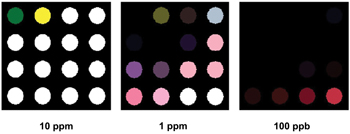Jan 25 2011
Researchers at the University of Illinois at Urbana-Champaign have developed a novel disposable sensor that is capable of detecting explosive products. In addition to the sensor, the researchers have also created a handheld scanner model that can read the results easily. The disposable sensor can detect even low-concentration explosives.
 Dot-size colorants
Dot-size colorants
Triacetone triperoxide or TATP, which was first developed in 1895, has been used in a number of terrorist incidents. Its chemical ingredients, which are easily available, cannot be detected easily. Unlike other types of nitro explosives, the TATP cannot be traced through ion mobility spectrometry and does not absorb ultraviolet light. Commercial techniques that are quite expensive can be used to detect TATP; however, the explosive cannot be detected in its vapor form. The new disposable sensor can detect explosives even in their vapor forms.
According to Kenneth S. Suslick, Chemistry Professor, the researchers studied TATP and applied their colorimetric approach towards this explosive. The team discovered that Amberlyst-15, a solid-acid catalyst, can change the vapor form of the explosive to hydrogen peroxide that could be detected easily.
The researchers then created a range of small, dot-size colorants on a sensor that measured about 1x1 cm. Images of the dots were created before and after exposure to TATP vapor in various concentrations. Individual concentration levels resulted in unique color pattern that indicated the molecular fingerprint for TATP. The researchers then determined the values of individual dots and developed color difference maps, which allowed them to trace TATP in vapor concentration forms. A Fourier transform IR multigas analyzer was used to validate the obtained data.